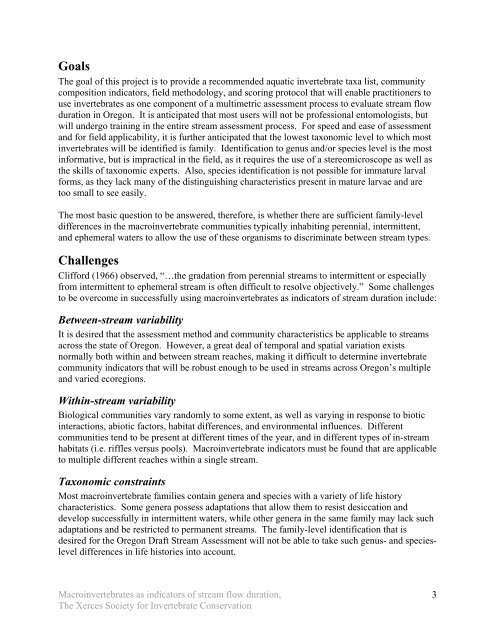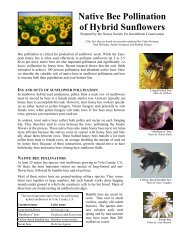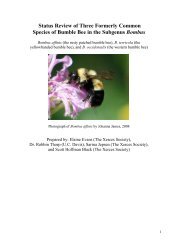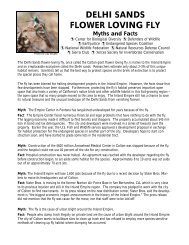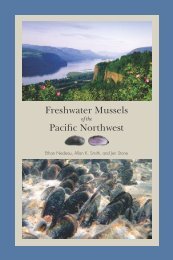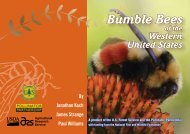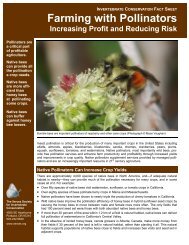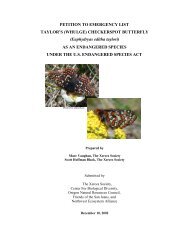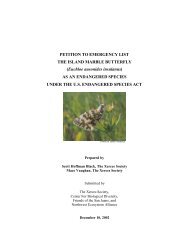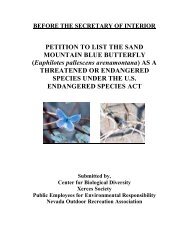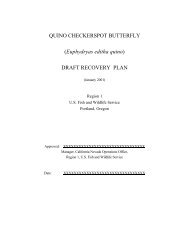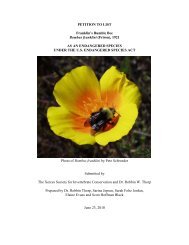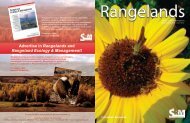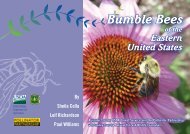Using Aquatic Macroinvertebrates as Indicators of Stream Flow ...
Using Aquatic Macroinvertebrates as Indicators of Stream Flow ...
Using Aquatic Macroinvertebrates as Indicators of Stream Flow ...
Create successful ePaper yourself
Turn your PDF publications into a flip-book with our unique Google optimized e-Paper software.
GoalsThe goal <strong>of</strong> this project is to provide a recommended aquatic invertebrate taxa list, communitycomposition indicators, field methodology, and scoring protocol that will enable practitioners touse invertebrates <strong>as</strong> one component <strong>of</strong> a multimetric <strong>as</strong>sessment process to evaluate stream flowduration in Oregon. It is anticipated that most users will not be pr<strong>of</strong>essional entomologists, butwill undergo training in the entire stream <strong>as</strong>sessment process. For speed and e<strong>as</strong>e <strong>of</strong> <strong>as</strong>sessmentand for field applicability, it is further anticipated that the lowest taxonomic level to which mostinvertebrates will be identified is family. Identification to genus and/or species level is the mostinformative, but is impractical in the field, <strong>as</strong> it requires the use <strong>of</strong> a stereomicroscope <strong>as</strong> well <strong>as</strong>the skills <strong>of</strong> taxonomic experts. Also, species identification is not possible for immature larvalforms, <strong>as</strong> they lack many <strong>of</strong> the distinguishing characteristics present in mature larvae and aretoo small to see e<strong>as</strong>ily.The most b<strong>as</strong>ic question to be answered, therefore, is whether there are sufficient family-leveldifferences in the macroinvertebrate communities typically inhabiting perennial, intermittent,and ephemeral waters to allow the use <strong>of</strong> these organisms to discriminate between stream types.ChallengesClifford (1966) observed, “…the gradation from perennial streams to intermittent or especiallyfrom intermittent to ephemeral stream is <strong>of</strong>ten difficult to resolve objectively.” Some challengesto be overcome in successfully using macroinvertebrates <strong>as</strong> indicators <strong>of</strong> stream duration include:Between-stream variabilityIt is desired that the <strong>as</strong>sessment method and community characteristics be applicable to streamsacross the state <strong>of</strong> Oregon. However, a great deal <strong>of</strong> temporal and spatial variation existsnormally both within and between stream reaches, making it difficult to determine invertebratecommunity indicators that will be robust enough to be used in streams across Oregon’s multipleand varied ecoregions.Within-stream variabilityBiological communities vary randomly to some extent, <strong>as</strong> well <strong>as</strong> varying in response to bioticinteractions, abiotic factors, habitat differences, and environmental influences. Differentcommunities tend to be present at different times <strong>of</strong> the year, and in different types <strong>of</strong> in-streamhabitats (i.e. riffles versus pools). Macroinvertebrate indicators must be found that are applicableto multiple different reaches within a single stream.Taxonomic constraintsMost macroinvertebrate families contain genera and species with a variety <strong>of</strong> life historycharacteristics. Some genera possess adaptations that allow them to resist desiccation anddevelop successfully in intermittent waters, while other genera in the same family may lack suchadaptations and be restricted to permanent streams. The family-level identification that isdesired for the Oregon Draft <strong>Stream</strong> Assessment will not be able to take such genus- and speciesleveldifferences in life histories into account.<strong>Macroinvertebrates</strong> <strong>as</strong> indicators <strong>of</strong> stream flow duration,The Xerces Society for Invertebrate Conservation3


